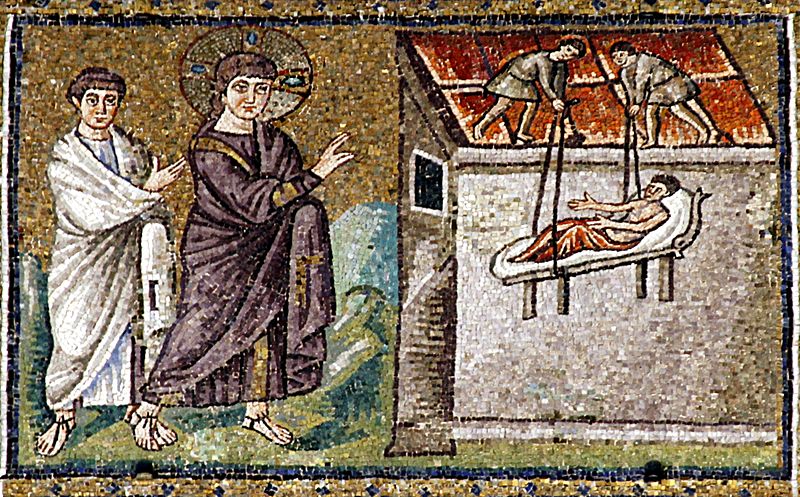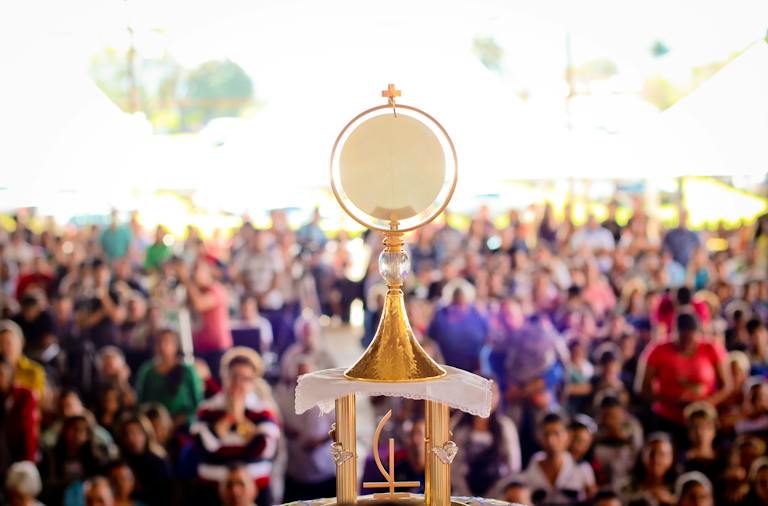There is No Eucharistic Revival without Radical Hospitality and the First Proclamation
In our series on how to foster a Eucharistic revival, we addressed the need to pray for and expect signs and wonders, and then the critical importance of small group spiritual multiplication. The third way to foster a Eucharistic revival is to invest in the hospitality and first proclamation model of evangelization. The first part of fostering this third way of revival is recognizing it needs to be done. We are not radically hospitable. People do not know the first proclamation.
I say often that since we have moved into a secular age, the Church needs to be very explicit about connecting the dots. What feels to an older generation like being “overly showy” is actually just a needed explanation of who we are, what we believe, and why we act the way we do to people who are confused and curious. People on the outside…and even many initiated Christians…need to know THE GOOD NEWS of Christianity. That we (and you) are infinitely valuable, loved by God, can be forgiven, and have been purchased at great price. Through no merit of our own, the Lord gives himself to us, and we are called to reflect him and share his transforming message of life and hope. This is most efficiently and effectively done in offering the first proclamation (which I just did, above). If we do not connect those dots explicitly for people, they will (at best) continue to muddle in their ignorance, without hope, and settling for less than God.
Radical hospitality and first proclamation is simply telling our story, the story entrusted to us by the Lord. And if we do not tell our own story, I promise you that others are telling untruths about us, and about God. They are telling these falsehoods to our children. Does that wake you up? Are we just going to let people, even our own children, believe lies?
I see this counter-story rooting most often with our youngest generations. Young people have to run a gauntlet at a very young age–no, not at 20, more like age 11-13 and afterward–where they are told by friends, teachers, media, and more that the Catholic Church is a source of ongoing injustice. They know every evil thing that has happened in the Church (and some evil things that get unjustly blamed on the Church) without knowing a single good thing, never mind the GOOD NEWS. The counter-story against Catholic Christianity very active in our culture. If we do not consistently share the first proclamation, that is no mercy to others. It is, frankly, mean. It also denies the call received at baptism–the call to share the good news that Jesus Christ, the Son of God, died to save us from our share in evil, and he has a glorious plan for our lives and the life of the world.
This model of evangelization (radical hospitality and first proclamation) is in some ways the meta-story of the Eucharistic revival. It is the essential foundation of our discipleship. It cannot be skipped if we are to think of ourselves in any sense as “missionary” (and last I heard, this is a primary goal of the revival).
First, hospitality is a conversion to God’s wounded people
Hospitality is the practice of welcoming the stranger. In fact, if you see the word “hospital” in there, it is more like welcoming the wounded stranger. Wounds can be self-inflicted, or they can be received at the hands of another. No matter. We welcome all the wounded. And radical hospitality is welcoming the wounded stranger without expectation of any compensation. Hospitality is the practice that assumes we have had a conversion, not just to God, but to God’s people. We see them as sent to us by the Lord himself, and we welcome them as we would welcome him.
This is a far cry from how most people tend to think of hospitality: upping the niceness. I’m all in favor of upping the niceness. But it isn’t the same thing as hospitality at all. Many churches will quickly argue that they need to work on hospitality first. Perhaps. But if they do, there is a danger of it being an exercise in upping the niceness rather than acting on a conversion to God’s people. People need to be converted in this way to do full throated Christian hospitality.
Second, the first proclamation names who God is for the wounded people
That brings us to the first proclamation, hard core “connecting the dots” of the Christian message: the who, the what, and the why in one or two sentences. Usually, the person offering the first proclamation is the priest and/or deacon. But all the baptized are called to share it in other circumstances, which will most often be conversation, in friendships, in families.
People often say that it isn’t necessary to revisit the first proclamation: that the first proclamation is embedded in the Mass, that people already know it. My responses are 1) it is necessary in the extreme, 2) yes it is embedded in the Mass, and yet 3) people still don’t know it.
The heart of the Eucharistic revival needs to be inviting people into deeper relationship with Jesus Christ. That relationship saves us and anchors everything in our life. The first proclamation is a proclamation of that relationship: Jesus Christ loves you and saves you and offers you life in God forever. This matters because of who Jesus is: truly God and truly man. You are known and loved by the Master of the Universe, the source of all power and glory that holds the stars in place. And he wants you–and wants you so much that humbles himself to become bread for us. It’s impossible to wrap one’s mind around, fully. But that is the crazy, transformative love the Son of God has for us. He took on human flesh for us. He died a horrendous death to save us. He gives himself to us in the most concrete way possible–as food. And he sends the Holy Spirit to live in us to light the way home to him. And this invitation isn’t the nice guy down the street…this is GOD.
The first proclamation underlines why the Eucharist matters. The Eucharist is the Lord’s way of being for us, with us, and bringing us home to him. I believe Thomas Merton was known for saying that the best reason to become Catholic was that it was the easiest way to become a saint. This is why we are Catholic Christians: The Lord humbles himself in the Eucharist to make it easy for us to be physically and spiritually close to him. What can be easier than eating? What could be more clear?
To foster a Eucharistic revival, we need to pray ardently for a conversion to God’s people and the anointing to share the story of what Jesus has done and is doing for us. We need to welcome that wounded stranger to come and see, and when ready, to receive. The Eucharistic Lord helps us become saints and leads us home to healing from brokenness.









